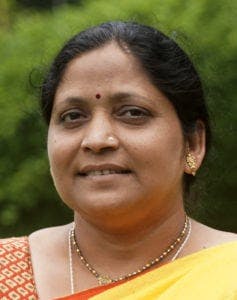Fighting for a Secure Space in a 'Graveyard'
Jun 4, 2019
First story
If I tell you I am from Soyegaon, Aurangabad, you will ask 'where?'
But, If I tell you I live near the UNESCO World Heritage Ajanta-Ellora Caves, then I am sure your answer will change from 'where?' to 'oh wow!' And at that moment you will feel confident of your own knowledge because you could pin my location, my origin.
For millions of women in my country, this knowledge remains beyond their reach. Whether it is about education, career, jobs, livelihood, medical care, law or policy - the first right to the information always goes to the men and then to women. It is not decided by law. It is also not decided by any religion or holy book. But it is how it is. The man of the house opens the newspaper first, reads it first, gets the news and the information on the world first. The woman? She is busy in household work. Its only when the man has left for work, and she has finished her hundreds of duties around the house that she will have a minute to pick up the paper and look at it, provided the man has not taken it with him to the office.
It is like this where I live. In my community, drought, loss of crops in the field, debt and depression is a common cycle of evil that every man and woman has seen in her lifetime. Suicides by men after losing his crop is now a part of life. To give you an idea, in 2017, 800 farmers committed suicide in our region (Marathwada) and this year, only in the summer there were nearly 300 farmers suicides (source: Indian Express newspaper).
But after the man has died, you ask the woman who he left behind - how much money did her husband earn? how much loan did he take? how much does it cost to buy seeds? what is the ideal price of grains and fertilizer? Ask any question and only answer you will hear is 'I do not know, my husband only knew.'
Now, imagine this: a woman's husband has died. There is no food at home. There will be no food coming from the field since drought destroyed it. And in addition to everything, she has no knowledge of where she can go to look for help. She has no knowledge of what alternative she has to get a livelihood and survive. Extreme loneliness, extreme helplessness and extreme poverty - all combined together. If this is not insecurity, what is?
It is this insecurity that I am fighting today. I am trying to free all our women - especially the single (widows) women whose husbands committed suicides from this insecurity and uncertainty of life by helping them find information and knowledge.
There are government schemes and policies for the farmers. There are policies for farmers who are affected by drought and farmers who have lost their crops. There are also policies for families of the farmers who have died in such situation. For example, only this year, the government launched 4 schemes which include free job-based skill training and a scheme for doing group farming.
What is missing is a plan to take this information to the widows and explain to them how to access these facilities - when they need them the most.
And this is a job I am doing for the past 18 years. As the president of Integrated Agricultural Rural Development Organisation - an organisation dedicated to welfare of women from rural communities , I organise meetings in villages with women and inform them on different facilities that are available for them. I help them write an application and follow up with the government officials to move these applications until the fund is released for these women to start a new life.
It may sound very easy and simple to you. But believe me, it is not easy at all. The biggest challenge is to convince women to come to a meeting. They are mourning, depressed, lonely, and frustrated with the whole world. Plus, I am not really giving away money or aid. So, just to come and sit and listen to someone speak is the last thing they want to do. Anyone who has worked with rural communities and in conditions like this, will understand what I am saying.
So, I have to try again and again and again. But I think this is how the road to empowerment is - it is not easy, it is hard, complicated and sometimes it is frustrating. So I tell myself, I have started with a mission which is to empower those who are not empowered. It is a mission to save lives from a cycle of insecurity. It is not a mission where I can just stop. No, I have to give it all I have. I have to try till I succeed because security for a woman never comes without a good fight.
So my fight is on. I have a long way to go. Droughts and suicides are not showing any signs of end. Often times, peopel and the media have called Marathwada region a "graveyard for farmers". There is thick darkness of insecurity. But just as new grass grows and new flowers bloom even on a burial ground, I dream of building a new world even in this region, with women who have the knowledge and the power of information to re-write their destiny and create a secure future for themselves and their loved ones.




